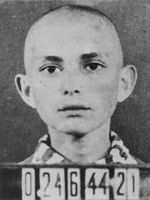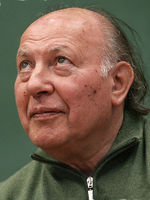Difference between revisions of "Category:Kertész, Imre (1929-2016)"
| Line 16: | Line 16: | ||
Imre Kertész was born November 9, 1929 in Budapest, Hungary to a Jewish family. During World War II, Kertész was deported in 1944 at the age of 14 with other Hungarian Jews to the Auschwitz concentration camp, and was later sent to Buchenwald. Upon his arrival at the camps, Kertész claimed to be a 16-year old worker, thus saving him from the instant extermination that awaited a 14-year old. After his camp was liberated in 1945, Kertész returned to Budapest, graduated from high school in 1948, and then went on to find work as a journalist, translator, and novelist. He told his story during the Holocaust in a semi-autobiographical novel ''Fateless'' (1992). Kertész won the Nobel Price in Literature in 2002. In 2005 he wrote the script of a movie, that he made even closer to his own personal experience. He died on 31 March 2016, aged 86, in Budapest, Hungary. | Imre Kertész was born November 9, 1929 in Budapest, Hungary to a Jewish family. During World War II, Kertész was deported in 1944 at the age of 14 with other Hungarian Jews to the Auschwitz concentration camp, and was later sent to Buchenwald. Upon his arrival at the camps, Kertész claimed to be a 16-year old worker, thus saving him from the instant extermination that awaited a 14-year old. After his camp was liberated in 1945, Kertész returned to Budapest, graduated from high school in 1948, and then went on to find work as a journalist, translator, and novelist. He told his story during the Holocaust in a semi-autobiographical novel ''Fateless'' (1992). Kertész won the Nobel Price in Literature in 2002. In 2005 he wrote the script of a movie, that he made even closer to his own personal experience. He died on 31 March 2016, aged 86, in Budapest, Hungary. | ||
[[Category:Holocaust Children Studies]] | |||
[[Category:Holocaust Children, 1929 (subject)]] | |||
[[Category:Holocaust Children, Hungary (subject)]] | |||
[[Category:Holocaust Children, 1929 (subject) | |||
[[Category:Holocaust Children, Hungary (subject) | |||
[[Category:Holocaust Children | [[Category:Holocaust Children, Memoirs (subject)]] | ||
[[Category:Holocaust Children | [[Category:Holocaust Children, Movies (subject)]] | ||
[[Category:Auschwitz (subject) | [[Category:Auschwitz (subject)]] | ||
[[Category:Buchenwald (subject) | [[Category:Buchenwald (subject)]] | ||
[[Category:Liberation of Buchenwald (subject) | [[Category:Liberation of Buchenwald (subject)]] | ||
[[Category:Nobel Prize | [[Category:Nobel Prize (subject)]] | ||
Latest revision as of 13:33, 20 March 2022
Imre Kertész (M / Hungary, 1929-2016), Holocaust survivor.
- First Hungarian to win the Nobel in Literature in 2002.
- KEYWORDS : <Hungary> <Auschwitz> <Buchenwald> <Liberation of Buchenwald>
- MEMOIRS : Fateless (1975; ET 1992) -- See Fateless (film, 2005), by Lajos Koltai.
Biography
Imre Kertész was born November 9, 1929 in Budapest, Hungary to a Jewish family. During World War II, Kertész was deported in 1944 at the age of 14 with other Hungarian Jews to the Auschwitz concentration camp, and was later sent to Buchenwald. Upon his arrival at the camps, Kertész claimed to be a 16-year old worker, thus saving him from the instant extermination that awaited a 14-year old. After his camp was liberated in 1945, Kertész returned to Budapest, graduated from high school in 1948, and then went on to find work as a journalist, translator, and novelist. He told his story during the Holocaust in a semi-autobiographical novel Fateless (1992). Kertész won the Nobel Price in Literature in 2002. In 2005 he wrote the script of a movie, that he made even closer to his own personal experience. He died on 31 March 2016, aged 86, in Budapest, Hungary.
Media in category "Kertész, Imre (1929-2016)"
The following 6 files are in this category, out of 6 total.
- Imre Kertesz child.jpg 194 × 259; 9 KB
- 1975 Kertész.jpg 574 × 1,000; 111 KB
- 1992 Kertész.jpg 325 × 500; 33 KB
- 1999 Kertész it.jpg 324 × 499; 25 KB
- 2005 Koltai (film).jpg 260 × 383; 19 KB
- 2005 Vasvári (ed).jpg 400 × 599; 216 KB







